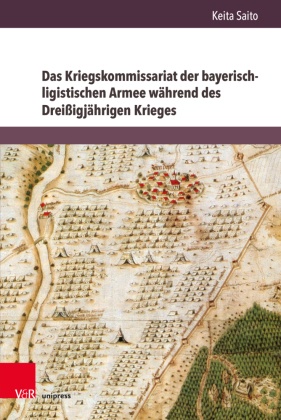
Das Kriegskommissariat der bayerisch-ligistischen Armee während des Dreißigjährigen Krieges - Dissertationsschrift
| Verlag | V&R unipress |
| Auflage | 2020 |
| Seiten | 346 |
| Format | 16,0 x 23,3 x 2,4 cm |
| Gewicht | 628 g |
| Reihe | Herrschaft und soziale Systeme in der Frühen Neuzeit Band 024 |
| ISBN-10 | 3847105388 |
| ISBN-13 | 9783847105381 |
| Bestell-Nr | 84710538A |
Der Autor untersucht die Funktionsweise und Entwicklung des Kriegskommissariats am Beispiel Bayerns im Dreißigjährigen Krieg. §§Die Führung des Söldnerheers im Dreißigjährigen Krieg - Resultat von Handlungen zahlreicher Akteure
Der Band beschäftigt sich mit dem bayerisch-ligistischen Kriegskommissariat im Dreißigjährigen Krieg, welches das bis dahin weitestgehend autonome Söldnerheer zu kontrollieren hatte und daher als beispielhaftes Forschungsobjekt fürstlicher Macht dieser Epoche gilt. Beschränkte sich die Forschung bisher auf die normative Ebene, nähert sich Keita Saito durch die Auswertung von Feldakten und Privatkorrespondenzen sowie durch die Anwendung der Methoden der Prosopographie und Netzwerkanalyse dem Thema multiperspektivisch. Auf diese Weise zeigt er das Zusammenspiel und die Verflechtung verschiedener Kompetenzen und Funktionen des sozialen Netzwerks für die Amtsausführung des Kriegskommissariats auf und leistet einen Beitrag zur Erfassung der Vielfältigkeit frühneuzeitlicher Herrschaftssysteme.
The Commissary of War in the Thirty Years' War presents itself as an object worthy of investigation with regard to its role of controlling free mercenary troops and thus enhanc ing power of princes in the Early Modern Europe. Focusing on the Bavarian Army, one of the best organized military forces in this era, this work sheds light on the activities of the commissaries that had been observed only from the normative perspective in hitherto studies. Analysis of primary sources such as military administration documents and private correspondence will show the entanglement of various competences and the functions of the social network for the commission holders in service. As a result, this work provides proof of the complexity of rulership in the Early Modern Europe.
The Commissary of War in the Thirty Years' War presents itself as an object worthy of investigation with regard to its role of controlling free mercenary troops and thus enhancing power of princes in the Early Modern Europe. Focusing on the Bavarian Army, one of the best organized military forces in this era, this work sheds light on the activities of the commissaries that had been observed only from the normative perspective in hitherto studies. Analysis of primary sources such as military administration documents and private correspondence will show the entanglement of various competences and the functions of the social network for the commission holders in service. As a result, this work provides proof of the complexity of rulership in the Early Modern Europe.
